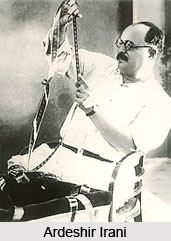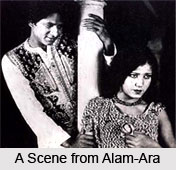 Ardeshir Irani is the man who made the first Indian talkie and the first Indian colour film. Irani began his film career as an exhibitor, after that he started to co-own Alexandra Theatre with Abdulally Esoofally in 1914. He was also the Mumbai agent for Universal Pictures. His theatre ran both foreign and Indian films - and the success of Phalke`s Kaliya Mardan and Krishna Janam convinced him to make his own. Later on, in a partnership with Bhogilal K. M. Dave, Irani set up Star Films Limited.
Ardeshir Irani is the man who made the first Indian talkie and the first Indian colour film. Irani began his film career as an exhibitor, after that he started to co-own Alexandra Theatre with Abdulally Esoofally in 1914. He was also the Mumbai agent for Universal Pictures. His theatre ran both foreign and Indian films - and the success of Phalke`s Kaliya Mardan and Krishna Janam convinced him to make his own. Later on, in a partnership with Bhogilal K. M. Dave, Irani set up Star Films Limited.
Given here is the list of a few films he made:
1922 - Veer Abhimanyu: The film starred Fatima Begum, who later became India`s first woman producer-director.
1923 - Krishna Arjuna Yuddha: Champaraj Hodain which the film`s `beautiful bathing scenes` were advertised.
However after these films Irani and Dave parted ways - the former forming Majestic Films and the latter, Sharda Film Company. Majestic Films continued the journey. Some films are given below:
1924 - Veer Durgadar: This film was based on the Rajput warrior who challenged and defeated Aurangzeb, the despotic Mughal emperors.
Bombay Ki Sethani or Call of Satan: This film was based on the true-life incident, and court-case, of a rich lady exchanging her child with another`s, while travelling by train.
 1925 - Naharsingh Dakoo: A film set in a fictitious kingdom, dealing with a good-hearted bandit who exposes the Minister and his wife and their treacherous doings.
1925 - Naharsingh Dakoo: A film set in a fictitious kingdom, dealing with a good-hearted bandit who exposes the Minister and his wife and their treacherous doings.
1927 - Wild Cat of Bombay: This film was extremely successful, and starred Sulochana as the golden-hearted girl who robbed the rich to feed the poor.
After these movies there were also the following movies: Alauddin and his Wonderful Lamp, Alibaba, Anarkali, Madhuri, Heer Ranjha and Magic Flute.
In 1931 - Alam Ara: This was the first full-length feature film with sound, i.e. the first Indian talkie. Wrath (re-released as Khuda Ki Shaan).The film dwelt on the bigoted society and the caste system. The tale tells of a woman from the `untouchable` caste: her rape by a Hindu, induction into prostitution by a Muslim, and the subsequent pariah status accorded to her by all. She is finally rescued and cared for by Baba Garibdas, who holds that caste and religion are man-made divisions invented by the unscrupulous. The actor who portrayed Garibdas bore an uncanny resemblance to Mahatma Gandhi. The censors subjected the film to harsh censoring.
1937 - Kisan Kanya: The first Indian film in colour. Ardeshir Irani firmly believed in sending Indians abroad to learn the craft of film-making rather than employing foreign experts.






